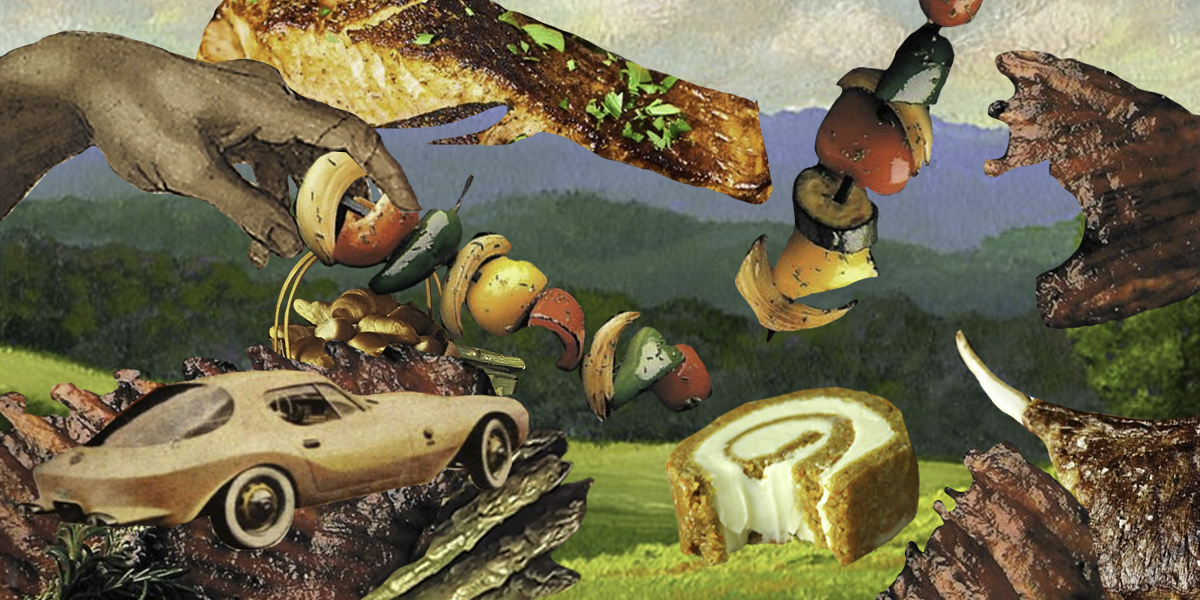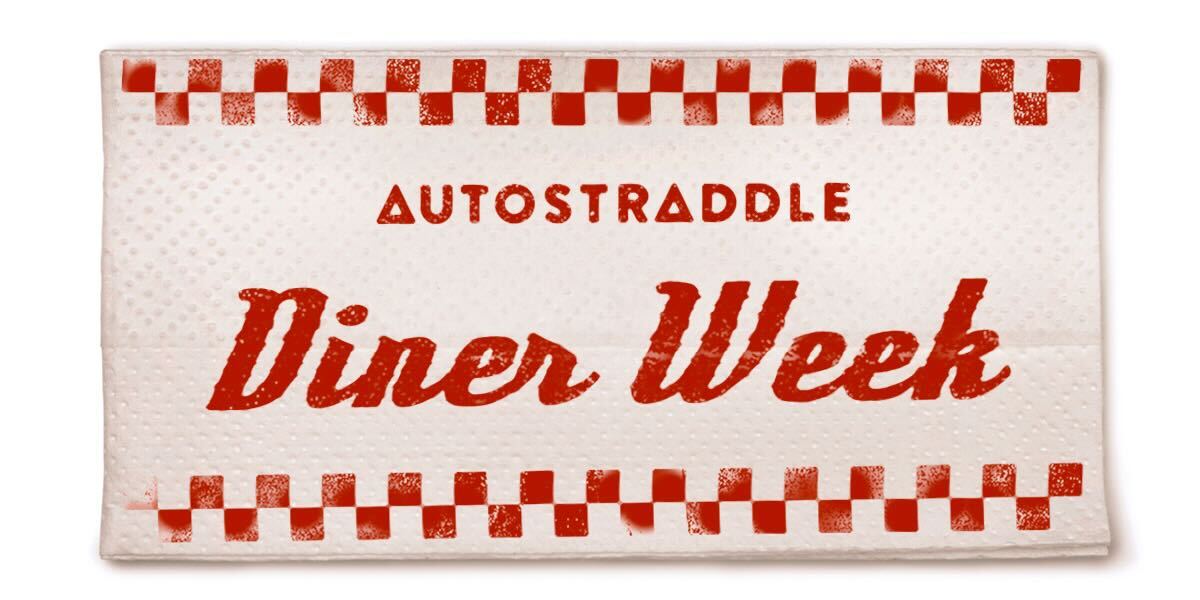
Diner Week – All Artwork by Viv Le
It was easy to miss her if you didn’t look hard enough. She — white, speckled, and rough around the edges — was quaint and pretty like those girls in white boys’ country songs. Graveled rocks and a wood patio welcomed you up to her, to the restaurant that will not change your life. In her vestibule, she bore reminders of those who she calls hers: baseball teams, farmers’ markets, local politicians for whom she is just another spot on the campaign trail. She was unremarkably reliable in the best of ways, like my socks I just happen to wear on Tuesdays, like the guy I always see at the park who loves to chat but never tells me his name, like sitting down and just trusting the chair will be there. She was always there, too, The Road House.
Our first Prime Rib Saturday came just a month after we moved to the mountains. My wife and I were speeding through the hills of southern Vermont when I proposed a special date night. “Numbers are low here,” I reminded her. This was part of how we ended up in the mountains in the first place. She, a teacher in Boston, was teaching remotely for a year. I, a student and researcher, could work anywhere and needed to breathe without fear of dying every day. The mountains offered that reprieve. Fewer people and fresh air had brought us here; low transmission rates helped me feel better about masking up and doing the things necessary for living, like grocery shopping, getting gas, picking up medicine, and, yes, date night. “What about that prime rib place?” I asked. “It seems fancy, and you deserve it.”
I don’t know anything about red meat. I stopped eating it years before I met my wife and haven’t looked back, but I know that menu prices don’t lie. I know that prime means of the best possible quality, and I know that Adam gave a rib to make Eve, so that means it must be the best. At least, that’s how my brain justified the cost of a piece of meat when dialing the restaurant’s number.
“No service,” I said, looking helplessly at my phone. There was never any service in the mountains unless we were at home — a trait I mostly loved but hated in moments like these.
“We’re almost at the clearing,” my wife responded and floored the Forester up the hill. We parked at the top next to the gift shop owned by two cranky sisters who liked me more than my wife and charged me a little bit less for their apple cider donuts.
I held my phone outside of the car window, waving it around, grasping for service. Until I heard a ring. A gruff voice answered. It was 4:30 p.m. They didn’t open until five, but the voice on the other end of the line already seemed exhausted. “I can’t hear you,” he croaked. I have bad service, I tried to say.
No service. One bar. Redial.
“You there?” the voice yelled. I handed the phone to my wife and mouthed YOU DO IT. This is how we usually make calls. I determine a call needs to be made. I dial the number. The person answers the phone. I briefly consider talking before silently handing the phone to my wife.
“Yes, I’m here,” she replied. She made a reservation for 5:30. Reservations were required at all places in the mountains that dared let you breathe and eat inside. “Martin,” the voice yelled back, and I gasped. How did he know? Was there talk of us in the town — the fat, interracial couple who had moved into the spot across from the river just south of town? “We got a caller ID,” the voice clarified before hanging up.
We sped back down the mountain into the valley to change into our best date-night attire. My wife, a tunic and leggings. I threw on my green corduroy button-up that felt like a snuggie. It was the best I could muster for a pandemic date night in small-town Vermont. When we’d decided to move into the apartment by the river, we rented a storage unit in a New Hampshire town halfway between Boston and Vermont. We boxed and stacked our nicest clothes, family heirlooms, and furniture into the five-by-five unit that smelled like forgotten memories and mothballs. Our little place in the mountains had no dressers — and no room for dressers — so I brought only the necessary. Flannels, jeans, joggers, boots, and a few button-up oxfords for special occasions like graduate school interviews, date nights to nowhere, and, eventually, Prime Rib Saturdays.
The parking lot betrayed The Road House dining room. In the September warmth, the insides of the building met us with just enough cool to stop my wife from sweating under her mask.
The host looked like our waitress who looked like the bartender who looked like the other waitress. As they passed, they all looked at me, and I looked back and smiled. I had taken to smiling and waving to white folks in the mountains. In their wave and smiles, I heard “Black Lives Matter,” so my response was partly niceties and mostly please don’t kill me. I am just trying to breathe.
Above our table, a landscape painting lay in a wood frame that matched the wood table, wood furniture, wood paneling. Should I pour one out for the trees who we lost in the making of this place? I sipped my Diet Coke instead.
The bread arrived first. “Baked fresh today,” the waitress said as she put the basket of sliced white bread in between us on the table. “Well-baked, lightly seasoned,” I announced to my wife. She almost choked on her piece and chuckled. “Stop it, shea!” she whispered and loaded unsalted butter on the unseasoned bread, saying a prayer to the flavor gods above.
“How was the bread? What’ll it be?” the waitress said when she returned a few moments later. I ignored her first question because Black folks can’t be honest about white folks’ food when ain’t no more of us around to back us up. I ordered the blackened salmon, emphasizing the Black because it is 2020, and I want to make sure she can see me through the flick of the candlelight.
“Prime Rib!” my wife exclaimed. “An end piece, please!”
“Oof, we just sold out of end pieces a few minutes ago,” the waitress replied. Behind her in the bar area, a middle-aged man-boy played covers of soft rock songs just a little slower than one might expect, “Wagon Wheel” and “Don’t Stop Believin’” becoming soft lullabies for our table and the few others around us.
I looked at my phone. 5:35. Just 35 minutes into dinner service, and the ends were gone. I knew this would be the last time this would happen, the last time my wife would ask for an end piece and be told there were none left, bested by grey-haired gentlemen thirty years her elder. I knew we would show up early next time.
Dejected she accepted “whatever you’ve got then” and pouted the rest of the way through dinner and dessert of homemade carrot cake and brownie a la mode.
When we left, the sun promised to wait until we made it to the mountaintop to watch her set for the evening. So we drove to the peak, like we did on most evenings, and watched her. I sanitized my hands more than I wanted, checked the Covid rates for the tenth time that day, and we promised ourselves we’d do more things that made us feel safe in a world that felt more unpredictable every day, like Prime Rib Saturdays with unflavored bread, early end cuts, and bad live music.
And we did.
We went back every Saturday. We learned one hostess was our neighbor. She’d just put her house on the market but would still stay in town. We learned that most people from the town stayed and those who weren’t from here didn’t stay long. We learned our waitresses were teachers on weekdays and Road House warriors on the weekend, working second jobs through the pandemic. We met Twitter followers and were reminded of the world we had desperately tried to escape. We found out the hard way that end cuts and fish don’t travel well down the road to our own kitchen. We found predictability and safety in the people, place, and food waiting for us.
Always end cuts.
Always Black(end) salmon.
Always dessert, add the ice cream.
Always that table, that painting, that music — too slow and too loud.
Always just us, them, and her — The Road House.
Always just us, them, and her, until we left the valley and she stayed because her prime rib tastes better in that house, atop a gravel lot, on the side of the road, behind a sign proclaiming the news of Prime Rib Saturday to those who might miss it if they aren’t looking hard enough.

Diner Week is a 12-part series of essays curated and edited by Autostraddle Managing Editor Kayla Kumari Upadhyaya.



this was delightful Shea!! now i have a craving for prime rib…
This was awesome, so evocative.
This was fantastic. Thank you.